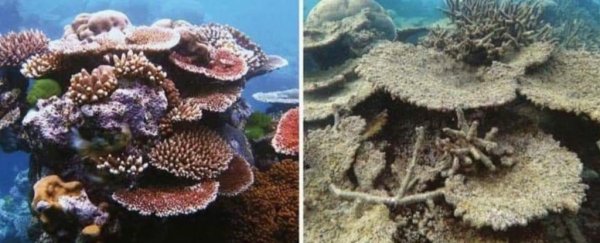With another year on the horizon, millions of people on social media are partaking in a viral new craze. It's called the #10YearChallenge, and the dare is simple: share two photos of yourself taken a decade apart and laugh at the contrast.
It was all fun and games - until we involved the environment.
Even though it can be fun to reflect on how much we change - or don't change - as individuals, it's way more terrifying to realise how much the face of our planet has been altered in just ten years.
Greenpeace was one of the first environmental organisations to poop all over the party, sharing a photograph of deforestation in the Amazon rainforest.
With a new Brazilian president promising to harvest even more of this region's precious resources, a reminder of our current destruction is pertinent, albeit discouraging.
"That which took nature hundreds of thousands of years to create, humans have destroyed in less than ten," the post reads.
It's not hard to find examples just like this. From climate change to pollution to species extinction, the environmental challenges this world has been facing for the last ten years are numerous. And from where we are currently sitting, there is no end in sight.
The Great Barrier Reef (GBR), like most other coral reefs around the world, faces a grim future, and scientists have warned that it can no longer be saved by current efforts.
In 2016, it was estimated that 93 percent of the GBR had been affected by coral bleaching, brought about by warming ocean temperatures.
According to the most recent report from the Intergovernmental Panel on Climate Change - a scientific body routinely criticised for being too conservative with its predictions - the world could experience a mass coral die-off as early as 2040.
But you don't even need stats like this to see the difference with your own eyes.
Sure, we're getting better at talking these tragedies out. But even though issues like pollution, and especially plastic pollution, have received more attention in recent years, our awareness may have come too late.
Seventy-nine thousand metric tonnes of plastic debris are now swirling in an area of the Pacific Ocean three times the size of France. But while this patch of garbage has been "increasing exponentially", our clean up efforts continue to get held up by roadblocks.
While some celebrities happily bragged about their unchanging beauty, others took the challenge in a more serious direction, hoping to use the craze as a way to raise awareness and elevate our concern for the one planet we all call home.
What will the Arctic look like in 10 more years? #ClimateAction becomes more urgent every day. It is my hope that both we, as individuals, and the organizations that represent us treat climate change as the urgent threat that it is. https://t.co/jqwCHF1RUP
— Leonardo DiCaprio (@LeoDiCaprio) January 18, 2019
Both the North and South poles are now facing unprecedented challenges, and in many ways, these fragile regions are on the front lines of climate change.
Currently, Antarctica is losing six times as much ice as it was four decades ago, and even the parts we thought would be safe are feeling the pressure.
Its northern counterpart is experiencing similar terrors. Since 1958, Arctic ice cover has lost about two-thirds of its thickness, while older ice has shrunk by almost 2 million square kilometres (800,000 square miles).
The #10YearChallenge we all need to wake up to. #FightForYourWorld © NASA pic.twitter.com/BQQ9VFKJDf
— WWF UK (@wwf_uk) January 16, 2019
It would be all too easy to blame environmentalists and "climate alarmists" for ruining what was otherwise an entertaining social activity.
But maybe, just maybe, it's worth the extra effort to reflect less on the messenger and more on the message itself.
If we can manage to do this, in ten years time, the contrast might be far less confronting. Who knows how much time we have.
